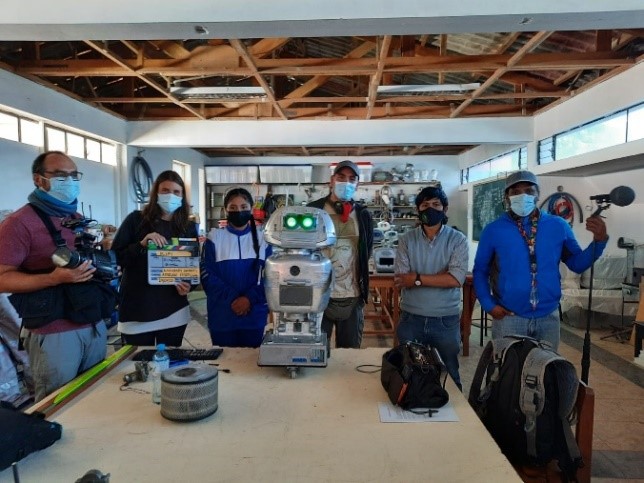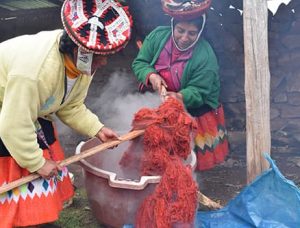The Spirit of Big Five Foundation reflects the core beliefs of Big Five to conserve and protect the best of what our planet has to offer. That encompasses conserving and protecting wildlife; working for poverty alleviation for some of the most vulnerable among us; education and healthcare for the next generation; and preserving the integrity of our global cultural heritage.
Active since: 08-01-2021. Region / Location: Peru

Due to the onset of the pandemic in 2020, schools in Peru were closed and education was provided through the internet and TV. However, in impoverished regions like Huancavelica with a lack of internet access, education is still a challenge and virtual education is unavailable. Despite these difficult circumstances, Walter got the idea to build a Quechua-speaking robot with recycled materials and solar energy. This robot has been previously programmed with the school curricula so Walter could raise the attention of the kids that were curious to learn and interact with this robot in regions where kids are still not able to visit a school. Kipi is a robot that can project videos through its eyes, interact with the kids with questions and answers, and soon will be able to use artificial intelligence and teach in over 40 local dialects.
His idea was so authentic that he was recognized as “promoter of Sciences in Peru” by the National Council of Science and Technology and awarded by the Peruvian Parliament. Above all else, what encourages him to keep working hard on improving the robots and reaching more communities is the joy of the kids while they learn and interact with Kipi. Currently, Walter has received the support of a private company to build 7 additional robots so he could bring education to more kids in rural areas. However, there is still a long way to go as half of the kids he teaches do not have internet service at home and still cannot receive a proper education. Due to the area’s geography, Walter travels by foot to each remote house in the mountains of Huancavelica with Kipi carried on the back of a llama or a donkey.
Huancavelica is one of the poorest regions of the country, which has been hardest hit by domestic terrorism and is one of the main cocaine-producing regions today. Young children, devoid of access to education and basic quality of life, have left no choice except to join in this illegal trade.
With your journey, the Spirit of Big Five Foundation is investing in and supporting Walter’s education project, supporting a better quality of life and opportunities for hundreds of kids, all with a way to fight against narcoterrorism through accessible interactive education.
Active since: 06-01-2021 . Region / Location: Guatemala
Sadly, 95% of all water in Guatemala is dangerous to drink. Guatemala’s water is the leading cause of death in many villages and one out of four rural public schools do not have potable water. This is how the Eco-filter school program was born. Its main two objectives are to distribute drinking water to community schools and involve parents in the “water for life” initiative so that children have access to purified water in both their schools and at home. Parents can purchase their water filter with access to different forms of payment plans that Eco-filter offers.
Eco-filters are handcrafted by local artisans and composed of a ceramic filtering unit (made of clay, sawdust, and colloidal silver) that hangs inside a container equipped with a top and a spigot for the filtered water. In the filtering unit, the fired clay produces microscopic pores that trap turbidity and bacteria. Each filter lasts about two years, and afterward, the filter can be used to enrich the soil and grow food.
So how does the program work? First, Eco-Filter assigns a community representative to identify the school that is most organized, motivated, and has high parent involvement. Once the school has been identified, the delivery of water filters is scheduled. On the day of the delivery, the Eco-Filter representative explains the importance of clean drinking water, the benefits of the water filter, and the payment plan options. The school principal is responsible for inviting all parents to the event to ensure control of the donations. If parents subscribe to the “Water for life” initiative, they receive their filter.
A donation of US$35 covers the cost of one filter for one classroom, including delivery and training. This eco-filter will provide 25 children with purified water for two years in a public school in the rural communities of Guatemala.
A

Awamaki is making a lasting impact in the remote mountains of Peru by giving rural Andean women a place to learn skills and have opportunities previously unavailable to them. They come to this women’s association to learn how to create and launch a small business creating authentic, high-quality products. Awamaki invests in women’s skills, connects them to markets, and supports their business leadership. The efforts provide women with a reliable source of income so they can increase their families’ quality of life and well-being as well as help lift their communities out of poverty. The cooperative operates a store in Ollantaytambo and sells in the United States through our online store, trunk shows, and partner retailers.
Awamaki was formed in early 2009 to support a cooperative of 10 women weavers from Patacancha, a rural Quechua community in the Andes of Peru. The association’s founders, Kennedy Leavens, from the U.S., and Miguel Galdo, from Peru, had worked together at a predecessor organization with the weaving cooperative for two years. When that organization collapsed, Miguel and Kennedy formed Awamaki to continue their work with the weavers. The organization grew rapidly to include programs in health and education, as well as other artisan cooperatives and a sustainable tourism program. In 2011, Awamaki spun its health program off into an independent sister organization and made the strategic decision to focus on income improvement and market access through fair trade artisan cooperatives and sustainable tourism. It has grown, too, in the number of women helped. The organization now works with eight cooperatives helping nearly 200 women.
Awamaki also offers training in quality control, product development, and technical skills improvement. During training, they teach color combination, natural dyes methods and weaving to measurement to weavers; fiber selection and spinning yarn to specified weights to spinners; stitching and reading patterns to knitters; and sewing, garment pattern-making, and design to seamstresses.
The artisans use their earnings to pay for essentials and education with 80% of artisans ranking food as the top expense for which they use their Awamaki income. Household and education came next.
When a cooperative of women starts in our program, typically no member of the cooperative earns the same or more than her husband. After 5+ years in our program, 68% of women in the cooperative report earning the same or more than her husband.
Awamaki’s accomplishments include:
The organization has developed a unique and sustainable model. Some 80% of its income comes from programs that generate income for the artisans and Awamaki, meaning that 100% of the donations are directly invested in women’s capacity-building, training, and market access.
UPDATE
For every $1 Awamaki receives in donations, they provide business training and market access that allows the women they work with to generate $4.10 in income to support their families. Awamaki currently supports 180 women artisans in our programs, who in turn support 612 children and elderly or disabled adults. Awamaki artisans working in tourism made $976 each, while the rest made $465 each, on average.
Through your contribution, together, we can all make a difference to bring a glimpse of hope and opportunity for a better quality of life to those less fortunate.